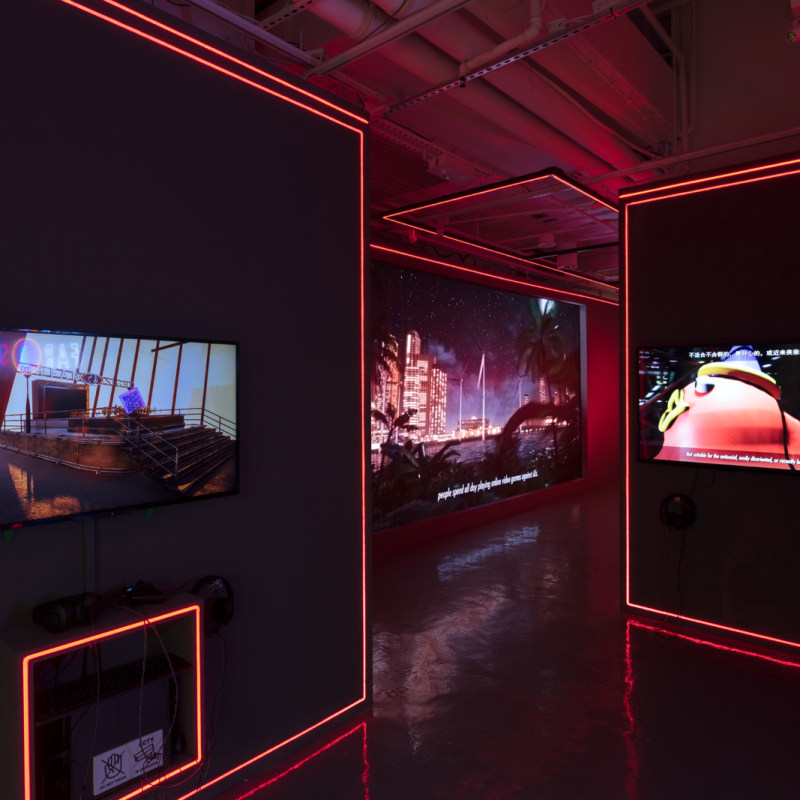In the year 2065, Farsight Corporation learns to harness the power of artificial intelligence. eSports is the world’s fastest-growing industry. With all work taken care of by algorithms, people spend all day playing video games against AIs. Inside the game, can anybody tell the difference between art and the world? Some people can sense it immediately, but others find that it takes them much longer. It’s not really clear, because nobody’s ever stopped playing.
From March to May 2018, K11 presents 2065, the first solo exhibition by London-based artist Lawrence Lek, in partnership with Sadie Coles HQ. In this, Lek develops his use of simulation as a site-specific and interactive medium, blurring the distinction between physical architecture and virtual space. Each component of the exhibition creates both a virtual realm and a critical narrative, investigating the relationships between replica and original, labour and creativity, and art and entertainment.
Conceived as a physical portal into a sprawling virtual world, the installation at K11 forms a ‘gaming zone’ in which visitors are active participants or players. The exhibition revolves around the newly-commissioned work, 2065: an ‘open-world’ video game set on a virtual island, which encompasses various locations including Singapore, Malaysia, and Hong Kong.
Each individual play of 2065 constitutes a different entry point into Lek's alternate reality. From a first-person perspective, players explore a parallel universe whose origins are gradually revealed through voiceover fragments, video extracts, and animated drones. This world is itself an architectural collage, a structure made up of other places. Players teleport between five zones: a simulacrum of K11 Chi Art Space in Hong Kong, the Play Station headquarters and a club operated by Farsight Corporation, and the museum and casino around Singapore's Marina Bay featured in Geomancer. Unlike the goal-driven systems of conventional video games, 2065 exists primarily as an exploratory experience – an envisioning of the future of art, aesthetics and artificial intelligence – which enables players to reflect on a world increasingly driven by technology.
Lek further explores the cultural impact of automation through the other works in the exhibition. As AI and robotics surpass humanity's capacity for physical labour and even creative tasks, society will be compelled to question the foundations of the human condition. In Play Station (2017), the entertainment and automation company Farsight portrays itself as a fun and inviting workplace in order to attract new employees. While drawing inspiration from the recruitment strategies of digital start-ups, the campaign disguises the reality that gaming and interactive entertainment could easily become another form of work.
In the feature-length film Geomancer (2017) originally commissioned for the Jerwood/FVU Awards – an AI satellite comes down to Singapore in the hope of becoming an artist. However, an international group of pro-human activists formulate the 'Anti-AI Art Law' as a result of their fears about the rise of creative AIs. While prohibiting AIs from entering galleries and art prizes might seem excessive, it might not be so far from reality. As technologies extend traditional notions of authorship, creativity in the new millennium will become an increasingly political frontier.
Lawrence Lek (b. 1982, b. Frankfurt am Main) is an artist based in London, working in fields of virtual reality and simulation. He creates site-specific virtual worlds and speculative films using gaming software, 3D animation, installation and performance. By rendering real places within fictional scenarios, his digital environments reflect the impact of the virtual world on our perception of reality. He studied at Trinity College, University of Cambridge, the Architectural Association, London, and The Cooper Union, New York. Recent exhibitions include: 'Hyperpavilion', Venice Biennale (2017); 'The New Normal', UCCA, Beijing (2017); Glasgow International, Tramway, Glasgow (2016); SeMA Biennale Mediacity Seoul 2016, Seoul Museum of Art, Seoul (2016); 'Missed Connections', Julia Stoschek Collection, Dusseldorf (2016); 'Secret Surface', KW Institute for Contemporary Art, Berlin (2016); 'Software, Hard Problem', Cubitt Gallery, London (2015); and 'The Uncanny Valley', Wysing Arts Centre, Cambridge (2015). Lek received the 2017 Jerwood/FVU Award, the 2015 Dazed Emerging Artist Award, and the 2015 Tenderflix Artist Video Award.
For further information please contact the gallery at +44 (0)20 7493 8611 or press@sadiecoles.com
